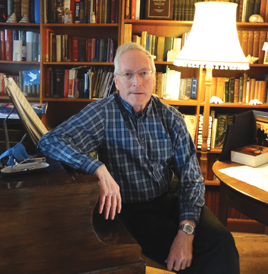This may be the last dispatch from me you ever read. I have jeopardised my position here at New Humanist, and the innumerable perks that go with it, by doing the unthinkable: I have joined a church.
St Paul had the road to Damascus I had Camden High Street. One minute I was happily sniggering at the assorted freaks and geeks that populate the Sunday market the next, I was clapping along to a gospel choir in full robes, led by a manic preacher railing against the great Satan: Starbucks. Along with hundreds of others on a balmy Sunday, I bore witness to the anticorporate word of Reverend Billy and the Church of Stop Shopping.
The Reverend, aka actor and producer Bill Talen, is on the road to preach a very simple message: corporations are killing communities, making us consumers rather than citizens, and we have to stop them.
Reverend Billy is a firm believer in the power of local communities: "When we lose any sense of connection with our neighbourhood, with our area, with our local grocers and butchers and coffee shops and bars when we lose that interaction, we become alienated, and increasingly powerless. . .
"Once this happens, we lose our feeling that we can make a difference to the world. Bush and Blair went to war last year, in spite of massive public opposition, because they knew that we didn't feel powerful enough to stop them."
Starbucks, for him, is the most obvious target: a ruthless multinational corporation masquerading as a neighbourhood café. Other culprits include Disney ("commodifying childhood") and 'big box' supermarkets which are hitting communities "like Darth Vader in charge of the Red Army".
The Reverend is already notorious in the US for his instore 'actions', to the extent that Starbucks even issued a memo to its staff, headed: "What do I do if Reverend Billy comes into my store?"
It tells you, for example, how to respond to customers who ask how you feel about Reverend Billy. Here's what you have to say:
"Starbucks has achieved success one cup at a time each one of our stores has become a unique part of its neighbourhood. Our stores are about people. The customers and partners (employees) at each location give the store its own personality and atmosphere."
Starbucks didn't appear to have distributed this memo in the UK. At least, it clearly hadn't reached the Camden Lock branch the first stop on Reverend Billy's Stop Shopping Tour.
After creeping incognito past the security guard, Billy and the 20strong Stop Shopping Choir suddenly go into full preaching mode. As the Reverend and the choir stand on the openair mezzanine of the café, singing their lungs out, the young staff come out and gaze up, halfamused, halfconfused.
Eventually (about one song in), realising that something's not quite right, the security guard attempts to grab Reverend Billy, who manages to evade him and continue his tirade.
Community Support Officers turn up a bit later, and, after trying to figure out what the hell is going on, semireluctantly escort Billy, still proselytising, from the premises, with half the tourist video cameras in Camden focused on him. All in all then, a success.
Later, out of character, Bill explains Reverend Billy's genesis: "The character evolved out of the paradox that the most powerful solo performers are either leftwing monologists, or fundamentalist preachers. I, myself, had come from a Midwest Calvinist background, and understood the power these preachers can have, often to inspire fear."
But how did this lead to today's anticorporate message?
"I think, through all I've done, there has been a need to resist norms whether they be artistic, religious, commercial or political. At the moment, throughout society, every norm seems to be laid down by corporations. Everything has become commodified, and we are increasingly under pressure to consume. What we ask is that people take a step back; back away from the product, close your eyes and create a space where the actual self emerges."
At his soldout performance in London's Conway Hall a few days after the Camden 'action', the Reverend is in his element, helping the 'congregation' to achieve that space.
He is a genuinely magnetic performer, with a real power over the audience. At one point, he exhorts them to hold up their 'evil' plastic, so that they may be 'exorcised'; incredibly, at least five people go one further, throwing their credit cards up on to the stage, and making no effort to reclaim them later.
The Church of Stop Shopping Choir are equally impressive a fullthroated gospel host, complete with amens, hallelujahs and even the occasional comedy skit.
It's a slick show, and one that, if only for one evening, forces you to think about your relationship to your surroundings, your fellow men, and the products that define us.

